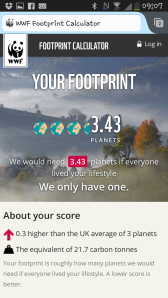As nurses we believe health is more than just bodily symptoms. Happiness and a sense of wellbing is as much a part of health as the physical. The Action for Happiness movement looks at what they believe are the 10 keys to happier living and I wondered if I could look at how these might link to addressing climate change. If helping the environment and becoming happier as an individual were linked, this can only be a good thing right? If I told you that helping to save the planet would also make you happier, you might be more inclined to join in I reckon. So these are my first thoughts on the subject.
Do things for others – Generosity helps connect us to other people and makes us feel good. I like to work to reduce my carbon emissions and raise awareness of climate change as I believe this benefits everyone. There are other practical ways of getting involved at a local level which will benefit other people. How about volunteering with a local wildlife trust / conservation group or campaigning on an issue which drives you?
Connect with people – taking time to strengthen relationships and our social networks is essential for happiness. So how about going for a walk with friends and family? Turning off the electronic devices won’t only reduce our electricity usage but might help strengthen our relationships and lead to happier lives.
Take care of your body – Being more active is a vital part of happier living. Methods of active travel such as walking or cycling are both beneficial to the environment and our health.
Notice the world around – Being more mindful and noticing the world around us can increase our wellbeing. Instead of eating in front of the TV, or listening to an mp3 player while walking to work why not focus on the task at hand. Notice the world – the sights, the smells, the sounds, again reducing our use of technology and therefore carbon emissions, and improving our wellbeing.
Keep learning new things – gardening? Cycling? There are a number of new skills we could learn which would also benefit the environment.
Have goals to look forward to – Choosing realistic goals can improve our sense of accomplishment if we manage to achieve them. How about setting up a local walking group? Or working towards a low carbon environment at work? Recycling your waste? Large or small, these will all help the environment and improve your happiness.
Find ways to bounce back – what doesn’t kill you makes you stronger so they say. And a key ingredient in resilience is optimism. Feeling positive and optimistic about making changes to help reduce our carbon emissions may also help foster a sense of resilience in us. If at first we don’t succeed…..
Take a positive approach – again, optimism. Look for ways to approach each day with the sense that you can make a difference. Recycle that plastic bottle with the attitude that you are indeed helping and that your contribution is vital.
Be comfortable with who you are – Don’t focus on your flaws. If you drove to the shops yesterday and you are feeling guilty as you could have walked, don’t. You can start again today. Be comfortable with the contribution you are making. No-one is perfect. Self esteem is vital for wellbeing. If we can feel good about who we are, maybe we can have more confidence to fight the bigger issues.
Be part of something bigger – What’s bigger than the fight to save the health of the world? Join a group. Connect with other people who want to make a difference. Working towards something which is bigger gives us meaning and purpose. And is key to a happier life.

